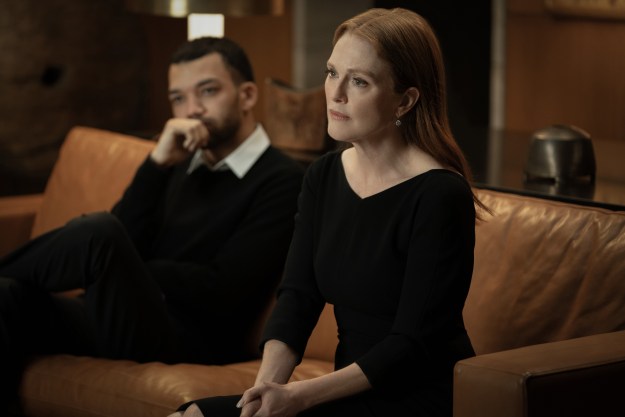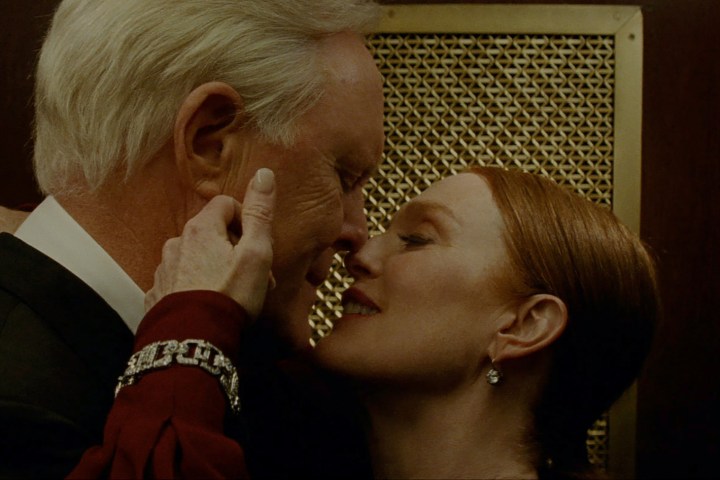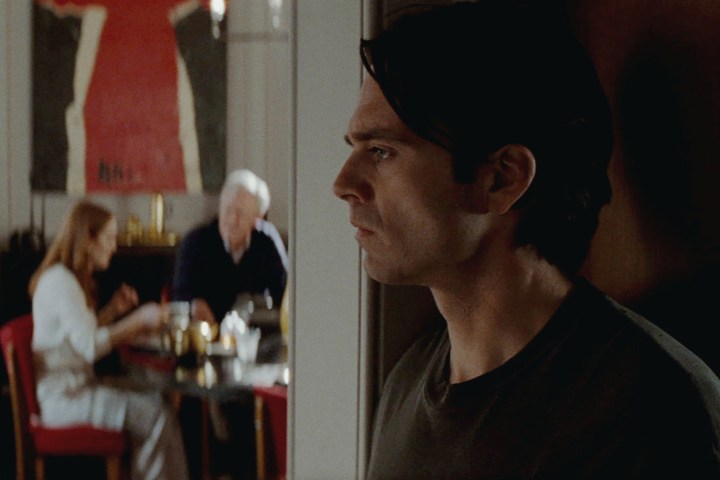
“Sharper is a slick and stylish new crime thriller that, despite its best efforts, doesn't quite manage to deliver the perfect con.”
- The film's unique, fractured structure
- Sebastian Stan and Julianne Moore's cold-hearted, charismatic performances
- Charlotte Bruus Christensen's cinematography
- The film's disappointing third act
- A last-minute twist that nearly breaks the film's con man logic
Sharper admirably attempts to pay tribute to one classic crime genre while also reinventing it at the same time. The film’s tendency to present certain events and relationships one way, only to later reveal the true nature of them, makes it a perfect spiritual successor to iconic con man movies like The Brothers Bloom, The Sting, and even The Usual Suspects. Its fractured, character-centric structure, however, feels decidedly modern. As a matter of fact, every time the film cuts to a new title card bearing a different character’s name, it’s easy to imagine a reality in which Sharper’s story has been stretched out to accommodate a Netflix or Apple TV+ limited series.
The film’s multi-perspective structure is an obvious gimmick, but it also allows Sharper to tell its story in a way that often isn’t predictable. Even more importantly, it gives the film a chance to present certain details and events in a nonlinear fashion that doesn’t require it to constantly overexplain their importance to the audience. The film’s trust in the intelligence of its viewers is, in fact, one of Sharper’s greatest strengths. The moments when the movie suffers the most are, conversely, when it doesn’t extend that same courtesy to its characters.

Sharper begins innocently enough. One night, while Tom (Justice Smith), the naïve son of a rich businessman (John Lithgow), is preparing to close the New York City bookstore that his father bought for him, he’s approached by Sandra (Briana Middleton). What starts out as a simple request for a book turns into a date and then a full-blown romance between the two characters. Tom falls hard for Sandra, so much so that he’s immediately willing to loan her $350,000 to bail her unseen brother out of a bad situation the moment she mentions it. After he does, Sandra promptly vanishes.
Her disappearance clears the way for Sharper’s multilayered story to truly begin. Through a series of subsequent chapters, Brian Gatewood and Alessandro Tanaka’s script reveals that Sandra was not, in fact, a kindhearted and well-read student who just so happened to walk into Tom’s bookstore one day. She was, instead, sent there by Max (Sebastian Stan), a coldhearted con man who saved Sandra from a bad experience one night and subsequently took her under his wing. In a later chapter, Sharper reveals how a separate con put Tom on Max’s radar in the first place.
To say much more about Sharper’s plot would be to spoil much of the fun of the film. For most of the movie’s runtime, Gatewood and Tanaka maintain such a steady, controlled flow of information that it becomes easy to stay invested in Sharper‘s various twists, turns, and acid-tongued conversations. None of the film’s chapters go on for too long, either, and although Sharper’s repeated narrative reversals serve an obvious function, they do succeed at imbuing it with a satisfying edge of unpredictability.

Behind the camera, director Benjamin Caron fills Sharper with enough intimate close-ups and smooth dolly shots to give the film a sleek, considered polish that only makes the sexy, duplicitous nature of its story that much more palpable. Caron’s emphasis on Sharper‘s various shades of blues, reds, and blacks also combines well with the shadowy cinematography that Charlotte Bruus Christensen brings to it. The film’s neo-noir visual style elevates, in particular, the dimly lit hotel room seductions and rooftop conversations that make up its early, Max and Sandra-centric section.
As Max, Stan turns in an admirably cold, slimy performance, which only further proves how at home the actor can be in roles that allow him to lean into full-blown villainy. Julianne Moore gives a similarly charismatic, delightfully narcissistic performance as Madeline, a mysterious woman who links herself to Lithgow’s Richard Hobbes. While Middleton, Stan, and Moore all make the most out of their characters’ humanity (or lack thereof), though, Smith isn’t able to bring the same level of charisma or depth to his performance as Tom.
The comparative flatness of Tom’s character ultimately comes back to bite Sharper in the end. For most of its runtime, the film is a slick and efficiently well-told con man thriller, one that delights in keeping its audience on its toes just as much as it does in embracing its fictional con artists’ cold-hearted tactics. When Sharper attempts to turn its inherent unpredictability around on its central thieves, however, the film loses not only much of its devilish charm, but also the underlying wit that makes its first two acts so engaging.

In its final third, Gatewood and Tanaka’s script attempts to pull off a series of reversals that push the film’s logic to its breaking point. Characters make decisions that make very little sense both within the context of Sharper‘s greater story and within its established underground world of criminals and con artists. The film’s final flashbacks rely, therefore, on viewers buying into the idea that Sharper‘s characters weren’t ever as intelligent as we’d been led to believe, which might have been easier to accept had its first hour not done such a good job of showing us otherwise.
Sharper, in other words, makes the same mistake as so many of the con man movies that have come before it. By attempting to pull off a series of increasingly surprising twists, the film ends up overextending itself and reaching beyond its grasp. Its script never fully justifies the film’s interest in certain one-note characters, which only makes their role in its eventual conclusion all the more disappointing. Fortunately, while these flaws do dull Sharper’s impact, they don’t fully erase its overall appeal.
The film feels, in many ways, like a homage to the kind of modest genre thrillers that were commonplace in the 1990s. The fact that it’s able to work as well as it does for so much of its runtime makes Sharper easy to recommend, too — even if it isn’t quite cutting enough to make much of a lasting impression.
Sharper is now playing in select theaters and available to stream on Apple TV+.
Editors' Recommendations
- What’s new on Apple TV+ this month (February 2023)
- Apple TV+ drops the first teaser for comedy thriller Sharper
- Slash/Back review: The kids are all right (especially when fighting aliens)
- Halloween Ends review: a franchise mercy kill
- Decision to Leave review: An achingly romantic noir thriller





